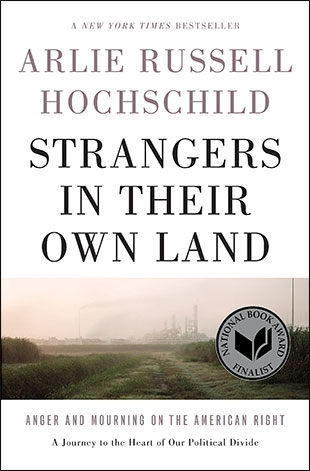Arlie Russell Hochschild is one of the most influential sociologists of her generation. She is the author of nine books, including The Managed Heart and The Outsourced Self. In this ambitious book, she leaves her hometown liberal milieu of Berkeley, California, and travels to arch-conservative Louisiana. There she interviews Tea Party members and supporters of Donald Trump.
Hochschild finds a lot of anger in this polarized part of America especially among poor white males. These true believers assert that while the country was founded on the work ethic, nowadays the name of the game is cheating. To illustrate what this means, the author uses the analogy of people who feel entitled to skip ahead in the line. Conservatives are convinced that African-Americans, women, immigrants, and refugees are line-cutters:
"Blacks, women, immigrants, refugees, brown pelicans — all have cut ahead of you in line. But it's people like you who have made this country great. You feel uneasy. It has to be said: the line cutters irritate you. They are violating the rules of fairness. You resent them, and you feel it's right that you do. So do your friends."
Hochchild's five year journey is animated by empathy and compassion for these working-class people who have become "strangers in their own land" due to declining wages, the demographic changes in the country, and the ridicule they endure at the hands of the liberal culture. She offers profiles and talks with six characters including a truck driver, a postal worker, a school custodian, and an auto mechanic.
Hats off to Hochschild for this affirmation of empathy and compassion as spiritual tools to address that rage and hatred afoot in America. She points out in the Preface the importance of understanding what "others" are feeling:
"The English language doesn't give us many words to describe the feeling of reaching out to someone from another world, and of having that interest welcomed. Something of its own kind, mutual, is created. What a gift. Gratitude, awe, appreciation; for me, all these words apply and I don't know which to use. But I think we need a special word, and should hold a place of honor for it, so as to restore what might be a missing key on the English-speaking world's cultural piano. Our polarization, and the increasing reality that we simply don't know each other, makes it too easy to settle for dislike and contempt."
